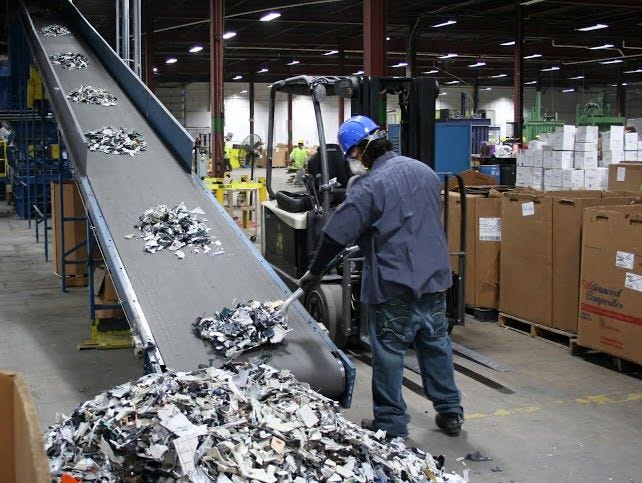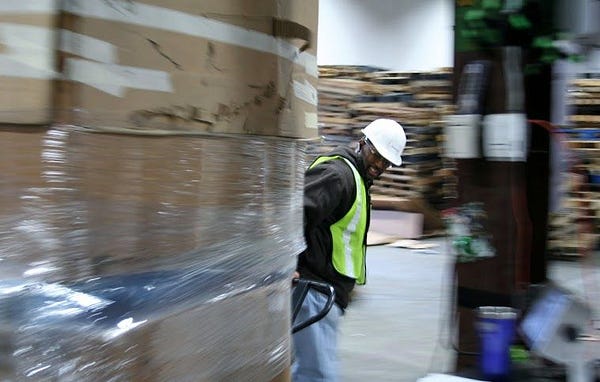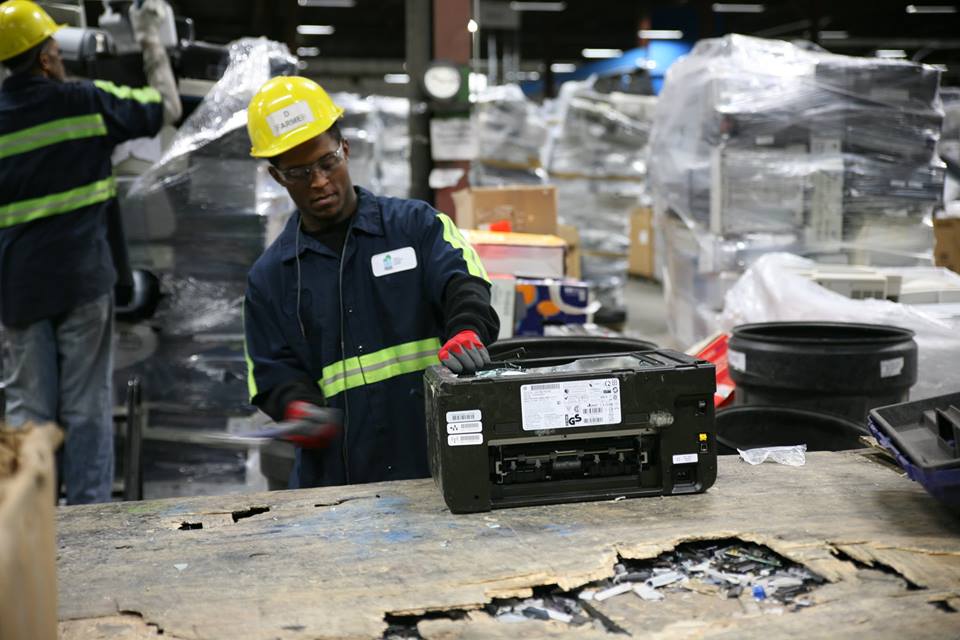(Note: This blog post was originally posted on the blog for the Open Road Alliance, Medium.com.)
In late 2017, RecycleForce was facing a crisis.
In 2012 we were forced to move from the former RCA plant when it was scheduled for demolition. We relocated to another blighted neighborhood in a facility that had been repossessed by a bank. We negotiated a low-cost, 13-year lease with the bank and became the building’s largest tenant.
In many ways, RecycleForce became the catalyst for new development in the community. We were the kind of business the economic developers needed to jump-start development in the struggling community. In late 2015, when a local developer purchased the building and began re-development, RecycleForce found itself the anchor tenant in the emerging “hip strip.” Planners used the term “urban manufacturing” to describe the Mass Ave/Brookside Industrial Corridor which had become a City priority for revitalizing industrial activity and employment.[1] Trendy restaurants, a micro-brewery, and an artist colony joined RecycleForce in this once under-utilized building.
A nearby shuttered Coca-Cola bottling plant was slated to become high-end condos. House prices rose. RecycleForce’s recycling business and prison reentry program found itself in the middle of a rapidly gentrifying neighborhood. We thought this was a good omen as our now well below market 13-year lease had us secured until 2025 and most people in the community were supportive of our work and mission. However, as it turns out, this is when our problems began.
When the irritating drips in the building’s roof began to gush after rainstorms, the new landlord was not willing to address the leaking roof over RecycleForce, although leaks in other parts of the building were fixed. Over a 12-month period, more than 30% of our space became unusable. It was apparent the landlord wanted us out.
We sued our landlord in 2016. Our pro bono lawyers determined that we had been “constructively evicted” and advised we could leave the space and vacate our lease. Not only is it difficult and expensive to move a major recycling operation with an 81,000 square foot footprint, $2 million worth of equipment, and 100 employees, we had nowhere to go.
Further compounding the issue was the US Department of Labor’s (US DOL) embargo of data that we believed would further rally the community, local government, and new funders behind our work. From 2012 to 2015, RecycleForce participated in one of the largest random assignment trials on the impacts of transitional jobs ever conducted. The Enhanced Transitional Jobs Demonstration program was designed to measure the impact of subsidized transitional employment on marginalized populations including citizens returning from prison. We knew we had generated a positive return on investment as well as significantly reduced return to prison and jail. But due to the embargo, we were not allowed to share the data.
From late 2016 through most of 2017, RecycleForce was forced into drastic cost-cutting measures for survival. We had unplanned expenses from water damage due to the leaking roof and flooding. We lost some funders as they began to question not only our effectiveness and business acumen, but our program model. Transitional jobs are time-limited, wage-paying employment coupled with social services and training for the most marginalized workers. The cost to serve a person in our program is $7,800. The average worker, who spends much of his/her paid time in training and development activities, generates $3,200 in revenue, less than half the program cost per person. With RecycleForce generating $1.6 million in revenue annually, some funders believed we should be able to operate on private revenue alone.
With various funding priorities at play in Indianapolis, embargoed data that could prove our cost-effectiveness, and a model that seemed overly expensive to some, RecycleForce struggled to secure funding. Our situation was dire. To stay viable, it appeared that we would have to temporarily abandon our social mission which is driven by a transitional jobs model that had been proven to increase income and reduce recidivism for returning citizens as well as reduce crime in the community. We were hoping for a miracle.
Then, in late 2017, not one, but a series of miracles occurred.

First the City of Indianapolis, which had plans to develop the now-vacant lot on which the RCA plant once stood — the place RecycleForce began 13 years prior — offered us 7.8 acres of land to build a new warehouse as part of its New Markets tax credit application.
Second, a local developer bought a building across the street from our current location and offered us shelter until we could receive the New Market allocation and raise the remaining funds to build a facility on our new permanent location.
The third miracle was that the Open Road Alliance came into our world. The level of sophistication of its leadership allowed them to quickly understand all the moving parts of our situation and that the RecycleForce data would play a major role in the national conversation about subsidized employment. Open Road understood that to abandon our social mission, even temporarily, would impact us at the critical time when the data would be released. The funding we received from Open Road allowed us to continue to serve 100 clients at a most critical time.

Today our equipment loans have been refinanced by a major bank, and that bank’s foundation awarded RecycleForce an $85,000 grant. A local foundation has expanded its funding, and the land transfer for our new location is scheduled for late 2018. We are still waiting on US DOL to allow us to share data from both the study and from a subsequent cost-benefit analysis. We hope the positive impact of the RecycleForce model which will be revealed when these data are released will attract the support of new funders who understand transitional jobs and subsidized employment, and perhaps even entice some prior funders to again support us. 2019 looks promising.
Without the support of Open Road Alliance, this RecycleForce saga may well have had a different ending — one that too many impact-focused organizations have. Because social enterprises do not have the same access to capital and resources that profit-driven companies do, one unfortunate circumstance — like a leaky roof — can put an otherwise successful organization out of business. It evidences the need for creative, flexible funding in the social sector. Without the help from Open Road we would have had to temporarily suspend our social mission of providing immediate employment to returning citizens. No funders have ever moved as quickly for us as Open Road did. Imagine the impact that the social sector could have if more bridge financing, flexible funding, and speedy disbursements were available to organizations making strong positive impact in our communities.


